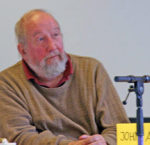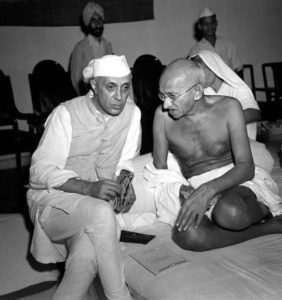We Need Their Voices Today! (14) Mahatma Gandhi
TRANSCEND MEMBERS, 25 Sep 2017
John Scales Avery, Ph.D. – TRANSCEND Media Service
Introduction
This is a collection of biographical sketches showing people whose wise voices from the past can help to guide us today. All of the women and men, brief glimpses of whose lives and ideas are portrayed here, gave a high place to compassion. None of them was a slave to greed. We need their voices today!
[Note from TMS editor: It will be posted one biographical sketch per week]
**********************************************
If humans are ever to achieve a stable global society in the future, they will have to become much more modest in their economic behavior and much more peaceful in their politics. For both modesty and peace, Gandhi is a useful source of ideas. The problems with which he struggled during his lifetime are extremely relevant to us in the 21st Century, when both nuclear and ecological catastrophes threaten the world.
Avoiding escalation of conflicts
Today we read almost every day of killings that are part of escalating cycles of revenge and counter-revenge, for example in the Middle East. Gandhi’s experiences both in South Africa and in India convinced him that such cycles could only be ended by unilateral acts of kindness and understanding from one of the parties in a conflict. He said, “An eye for an eye makes the whole world blind”.
Ends and means
To the insidious argument that “the end justifies the means”, Gandhi answered firmly: ”They say that ‘means are after all means’. I would say that ‘means are after all everything’. As the means, so the end. Indeed, the Creator has given us limited power over means, none over end… The means may be likened to a seed, and the end to a tree; and there is the same inviolable connection between the means and the end as there is between the seed and the tree. Means and end are convertable terms in my philosophy of life.”
Steps towards a nonviolent world
Gandhi’s advocacy of non-violence is closely connected to his attitude towards ends and means. He believed that violent methods for achieving a desired social result would inevitably result in an escalation of violence. The end achieved would always be contaminated by the methods used. He was influenced by Leo Tolstoy with whom he exchanged many letters, and he in turn influenced Martin Luther King and Nelson Mandela.
The power of truth
Gandhi was trained as a lawyer, and when he began to practice in South Africa, in his first case, he was able to solve a conflict by proposing a compromise that satisfied both parties. Of this result he said, “My joy was boundless. I had learnt the true practice of law. I had learnt to find out the better side of human nature and to enter men’s hearts. I realized that the true function of a lawyer was to unite parties riven asunder.” When Gandhi became involved with the struggle for civil rights of the Indian minority in South Africa, his background as a lawyer once more helped him. This time his jury was public opinion in England. When Gandhi lead the struggle for reform, he insisted that the means of protest used by his followers should be non-violent, even though violence was frequently used against them. In this way they won their case in the court of public opinion. Gandhi called this method of protest “satyagraha”, a Sanscrit word meaning “the power of truth”. In today’s struggles for justice and peace, the moral force of truth and nonviolence can win victories in the court of world public opinion.
Harmony between religious groups
Gandhi believed that at their core, all religions are based on the concepts of truth, love, compassion, nonviolence and the Golden Rule. When asked whether he was a Hindu, Gandhi answered, “Yes I am. I am also a Christian, a Muslim, a Buddhist and a Jew.” When praying at his ashram, Gandhi made a point of including prayers from many religions. One of the most serious problems that he had to face in his efforts to free India from British rule was disunity and distrust, even hate, between the Hindu and Muslim communities. Each community felt that with the British gone, they might face violence and repression from the other. Gandhi made every effort to bridge the differences and to create unity and harmony. His struggles with this problem are highly relevant to us today, when the world is split by religious and ethnic differences.
Solidarity with the poor
Today’s world is characterized by intolerable economic inequalities, both between nations and within nations. 18 million of our fellow humans die each year from poverty-related causes. 1.1 billion people live on less than $1 a day, 2.7 billion live on less than $2. Gandhi’s concern for the poor can serve as an example to us today, as we work to achieve a more equal world. He said, “There is enough for every man’s need, but not for every man’s greed.”
Voluntary reduction of consumption
After Gandhi’s death, someone took a photograph of all his worldly possessions. It was a tiny heap, consisting of his glasses, a pair of sandals, a homespun cloth (his only garment) and a watch. That was all. By reducing his own needs and possessions to an absolute minimum, Gandhi had tried to demonstrate that the commonly assumed connection between wealth and merit is false. This is relevant today, in a world where we face a crisis of diminishing resources. Not only fossil fuels, but also metals and arable land per capita will become scarce in the future. This will force a change in lifestyle, particularly in the industrialized countries, away from consumerism and towards simplicity. Gandhi’s example can teach us that we must cease to use wealth and “conspicuous consumption” as a measure of merit.
Gandhian economics
In his autobiography, Mahatma Gandhi says: “Three moderns have left a deep impression on my life and captivated me: Raychandbhai (the Indian philosopher and poet) by his living contact; Tolstoy by his book ‘The Kingdom of God is Within You’; and Ruskin by his book ‘Unto This Last’.” Ruskin’s book, “Unto This Last”, which Gandhi read in 1904, is a criticism of modern industrial society. Ruskin believed that friendships and warm interpersonal relationships are a form of wealth that economists have failed to consider. He felt that warm human contacts are most easily achieved in small agricultural communities, and that therefore the modern tendency towards centralization and industrialization may be a step backward in terms of human happiness. While still in South Africa, Gandhi founded two religious Utopian communities based on the ideas of Tolstoy and Ruskin, Phoenix Farm (1904) and Tolstoy Farm (1910).
Because of his growing fame as the leader of the Indian civil rights movement in South Africa, Gandhi was persuaded to return to India in 1914 and to take up the cause of Indian home rule. In order to reacquaint himself with conditions in India, he travelled tirelessly, now always going third class as a matter of principle.
During the next few years, Gandhi worked to reshape the Congress Party into an organization which represented not only India’s Anglicized upper middle class but also the millions of uneducated villagers who were suffering under an almost intolerable burden of poverty and disease. In order to identify himself with the poorest of India’s people, Gandhi began to wear only a white loincloth made of rough homespun cotton. He traveled to the remotest villages, recruiting new members for the Congress Party, preaching non-violence and “firmness in the truth”, and becoming known for his voluntary poverty and humility. The villagers who flocked to see him began to call him “Mahatma” (Great Soul).
Disturbed by the spectacle of unemployment and poverty in the villages, Gandhi urged the people of India to stop buying imported goods, especially cloth, and to make their own. He advocated the reintroduction of the spinning wheel into village life, and he often spent some hours spinning himself. The spinning wheel became a symbol of the Indian independence movement, and was later incorporated into the Indian flag.
The movement for boycotting British goods was called the “Swadeshi movement”. The word Swadeshi derives from two Sanskrit roots: Swa, meaning self, and Desh, meaning country. Gandhi described Swadeshi as “a call to the consumer to be aware of the violence he is causing by supporting those industries that result in poverty, harm to the workers and to humans or other creatures.”
Gandhi tried to reconstruct the crafts and self-reliance of village life that he felt had been destroyed by the colonial system. “I would say that if the village perishes, India will perish too”, he wrote, “India will be no more India. Her own mission in the world will get lost. The revival of the village is only possible when it is no more exploited. Industrialization on a mass scale will necessarily lead to passive or active exploitation of the villagers as problems of competition and marketing come in. Therefore we have to concentrate on the village being self-contained, manufacturing mainly for use. Provided this character of the village industry is maintained, there would be no objection to villagers using even the modern machines that they can make and can afford to use. Only they should not be used as a means of exploitation by others.”
“You cannot build nonviolence on a factory civilization, but it can be built on self-contained villages… Rural economy as I have conceived it, eschews exploitation altogether, and exploitation is the essence of violence… We have to make a choice between India of the villages that are as ancient as herself and India of the cities which are a creation of foreign domination…”
“Machinery has its place; it has come to stay. But it must not be allowed to displace necessary human labour. An improved plow is a good thing. But if by some chances, one man could plow up, by some mechanical invention of his, the whole of the land of India, and control all the agricultural produce, and if the millions had no other occupation, they would starve, and being idle, they would become dunces, as many have already become. There is hourly danger of many being reduced to that unenviable state.”
In these passages we see Gandhi not merely as a pioneer of nonviolence; we see him also as an economist. Faced with misery and unemployment produced by machines, Gandhi tells us that social goals must take precedence over blind market mechanisms. If machines are causing unemployment, we can, if we wish, and use labor-intensive methods instead. With Gandhi, the free market is not sacred; we can do as we wish, and maximize human happiness, rather than maximizing production and profits.
Mahatma Gandhi was assassinated by a Hindu extremist on January 30, 1948. After his death, someone collected and photographed all his worldly goods. These consisted of a pair of glasses, a pair of sandals, a pocket watch and a white homespun loincloth. Here, as in the Swadeshi movement, we see Gandhi as a pioneer of economics. He deliberately reduced his possessions to an absolute minimum in order to demonstrate that there is no connection between personal merit and material goods. Like Veblen, Mahatma Gandhi told us that we must stop using material goods as a means of social competition. We must start to judge people not by what they have, but by what they are.
Mahatma Gandhi, Great Soul Gandhi, we need your voice today!
Contents:
14 Mahatma Gandhi
15 Martin Luther King
16 Wilfred Owen
17 Albert Einstein
18 Edna St. Vincent Millay
19 Bertha von Suttner
20 George Orwell
21 Helen Keller
22 We need their voices, and yours!
________________________________________________
 John Scales Avery, Ph.D., who was part of a group that shared the 1995 Nobel Peace Prize for their work in organizing the Pugwash Conferences on Science and World Affairs, is a member of the TRANSCEND Network and Associate Professor Emeritus at the H.C. Ørsted Institute, University of Copenhagen, Denmark. He is chairman of both the Danish National Pugwash Group and the Danish Peace Academy and received his training in theoretical physics and theoretical chemistry at M.I.T., the University of Chicago and the University of London. He is the author of numerous books and articles both on scientific topics and on broader social questions. His most recent books are Information Theory and Evolution and Civilization’s Crisis in the 21st Century (pdf).
John Scales Avery, Ph.D., who was part of a group that shared the 1995 Nobel Peace Prize for their work in organizing the Pugwash Conferences on Science and World Affairs, is a member of the TRANSCEND Network and Associate Professor Emeritus at the H.C. Ørsted Institute, University of Copenhagen, Denmark. He is chairman of both the Danish National Pugwash Group and the Danish Peace Academy and received his training in theoretical physics and theoretical chemistry at M.I.T., the University of Chicago and the University of London. He is the author of numerous books and articles both on scientific topics and on broader social questions. His most recent books are Information Theory and Evolution and Civilization’s Crisis in the 21st Century (pdf).
This article originally appeared on Transcend Media Service (TMS) on 25 Sep 2017.
Anticopyright: Editorials and articles originated on TMS may be freely reprinted, disseminated, translated and used as background material, provided an acknowledgement and link to the source, TMS: We Need Their Voices Today! (14) Mahatma Gandhi, is included. Thank you.
If you enjoyed this article, please donate to TMS to join the growing list of TMS Supporters.

This work is licensed under a CC BY-NC 4.0 License.

